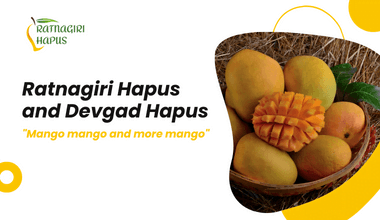
This blog is shown the difference between two mangoes, Ratnagiri Hapus and Devagd Hapus. basically, they both are the same. Alphonso famously known as Hapoos in Marathi is a seasonal mango cultivar that is considered one of the best in terms of sweetness, richness and flavour. we know that mangoes have different types in India. There is no trace of doubt that Mango (Alphonso Mango) is the most loved and popular fruit in our beautiful country- India, and why shouldn’t it be? There is nothing more refreshing, delicious and silky smooth as a bite of mango. The summer season is here and with it comes the entry of the king of fruits- Mango, a true national obsession. With its sunshine yellow skin, hints of red, the glowing and succulent flesh- the type Alphonso is nothing short of sweet pleasure. Mango lovers, you know the feels!
Alphonso mangoes to are classified into Devgad mangoes and Ratnagiri mangoes. Both these varieties are grown in western Maharashtra with a pleasant fruity smell, no fibre and extremely aromatic and sweet taste, becoming popular among buyers. The distinctiveness comes from the geographical conditions of Devgad as the same is not observed in other varieties grown elsewhere.
The Ratnagiri Alphonso Mango is smaller and has more delicate skin that shrivels more when ripe. Early in the ripening process, the Ratnagiri Alphonso Mango develops its flavour and then fine-tunes it as it ripens. So a Ratnagiri Alphonso that isn’t quite ripe would still taste nice.
The Ratnagiri mangoes have shades of saffron colour. Ratnagiri mangoes acquire the taste a little earlier before they are ripe. The season for Ratnagiri mangoes starts in early April and can easily last till mid–May. Ratnagiri Alphonso Mangoes are grown with organic manure, and hence it is called Organic Alphonso Mango to combat deteriorating yield caused using chemicals. Thus Ratnagiri Alphonso Mangoes are cultivated with natural processes. Farmers slice the grass on their farms and use it as compost, mixing leaves of plants and Cow dung mixtures for fertile soil.
With scorching sun and cold weather being near the seashore, which is known for the best Organic Ratnagiri Alphonso, hence it is called organic Ratnagiri Alphonso Which is called Ratnagiri Hapus. With succulent saffron-coloured mouthwatering flesh that is as smooth as butter.
Which tastes like a fruit which is a cross between apricot, a small note of citrus & honey, melon, nectarine, peach with a heavenly taste which you can just seatback and keep having one after another piece with its Magnofecient taste
Devgad Hapus
The Devgad Alphonso Mango is larger and has a thicker skin that does not wrinkle easily (but it does shrivel uniformly when ripe), giving it a more attractive appearance. The Devgad Alphonso Mango comes into its own later in the ripening cycle, so if you eat it before it’s fully ripe, it’ll probably taste sour. Devgad mangoes have a combination of yellow and orange.
the Devgad Alphonso Mango has a stronger and thicker coat. Hence, they’re less prone to getting wrinkles. Devgad mangoes have a pleasant fruity smell and a sweet taste sans fibre. Devgad Alphonso mangoes for this very reason are very popular among the masses. The most amazing thing is that even having wrinkles does not change its incredible taste. Devgad Alphonso Mangoes, the season starts in mid-may and also gets over within a few weeks.
Devgad is a tiny taluka comprising 98 villages and mango orchids that span over 45,000 hectares of land. It boasts a small harbour, a beach, a lighthouse, and a fort. However, this tiny taluka produces export-grade Alphonso mangoes. Devgad alphonso mango unique is in its medium size, attractive yellow-orange colour, thin skin, and thick pulp. It has skin that is much thinner than other kinds of Alphonso mangoes. This thin skin ensures that the fruit yields more of that rich, creamy, and sweet goodness! It is the purest and finest quality naturally grown mango on the market. Devgad mango, however, is a 100% naturally ripened, carbide-free mango. These Mangoes show gradients in yellows & green colour. Look and feel soft if they are naturally ripened in grass hay. The sweet, strong fragrance of Alphonso is noticeable from distance. Should not show wrinkles. If they are overripe, they show wrinkles.
Their superior quality has earned them a GI tag: Geographical Indication tag. A GI tag is a hallmark of the authenticity and quality of a product produced in a particular region.
A GI tag also grants the sellers of a particular geographical region, the intellectual rights of the product.
The outer layer (skin) of fully ripe Alphonso mangoes turns a bright golden yellow with an orange tint spread across the top and has just the right amount of firmness for a perfect bite of the slice.
Along with being rich and sweet in taste, the orange flesh of the fruit has a taste, unlike anything you’ve ever had before. It’s almost like a cross between an apricot, nectarine, peach, and melon with hints of honey and citrus all rolled into one. they have a finger-licking taste which no one can get over. you may know that Hapus mangoes have also got a Geographical Indication tag which is indeed a great deal for the country